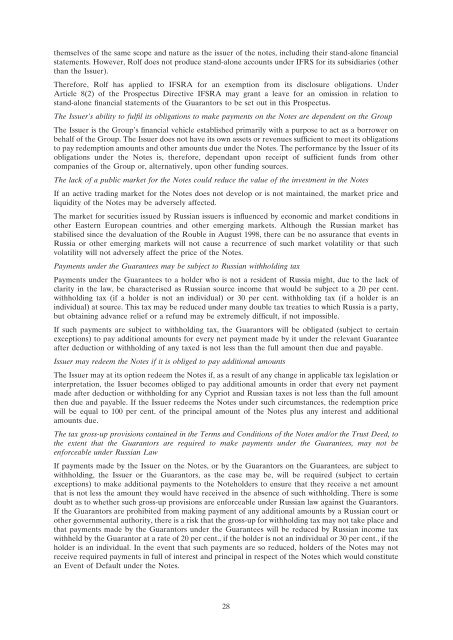Rolf Group International Financial Reporting ... - Irish Stock Exchange
Rolf Group International Financial Reporting ... - Irish Stock Exchange
Rolf Group International Financial Reporting ... - Irish Stock Exchange
You also want an ePaper? Increase the reach of your titles
YUMPU automatically turns print PDFs into web optimized ePapers that Google loves.
themselves of the same scope and nature as the issuer of the notes, including their stand-alone financial<br />
statements. However, <strong>Rolf</strong> does not produce stand-alone accounts under IFRS for its subsidiaries (other<br />
than the Issuer).<br />
Therefore, <strong>Rolf</strong> has applied to IFSRA for an exemption from its disclosure obligations. Under<br />
Article 8(2) of the Prospectus Directive IFSRA may grant a leave for an omission in relation to<br />
stand-alone financial statements of the Guarantors to be set out in this Prospectus.<br />
The Issuer’s ability to fulfil its obligations to make payments on the Notes are dependent on the <strong>Group</strong><br />
The Issuer is the <strong>Group</strong>’s financial vehicle established primarily with a purpose to act as a borrower on<br />
behalf of the <strong>Group</strong>. The Issuer does not have its own assets or revenues sufficient to meet its obligations<br />
to pay redemption amounts and other amounts due under the Notes. The performance by the Issuer of its<br />
obligations under the Notes is, therefore, dependant upon receipt of sufficient funds from other<br />
companies of the <strong>Group</strong> or, alternatively, upon other funding sources.<br />
The lack of a public market for the Notes could reduce the value of the investment in the Notes<br />
If an active trading market for the Notes does not develop or is not maintained, the market price and<br />
liquidity of the Notes may be adversely affected.<br />
The market for securities issued by Russian issuers is influenced by economic and market conditions in<br />
other Eastern European countries and other emerging markets. Although the Russian market has<br />
stabilised since the devaluation of the Rouble in August 1998, there can be no assurance that events in<br />
Russia or other emerging markets will not cause a recurrence of such market volatility or that such<br />
volatility will not adversely affect the price of the Notes.<br />
Payments under the Guarantees may be subject to Russian withholding tax<br />
Payments under the Guarantees to a holder who is not a resident of Russia might, due to the lack of<br />
clarity in the law, be characterised as Russian source income that would be subject to a 20 per cent.<br />
withholding tax (if a holder is not an individual) or 30 per cent. withholding tax (if a holder is an<br />
individual) at source. This tax may be reduced under many double tax treaties to which Russia is a party,<br />
but obtaining advance relief or a refund may be extremely difficult, if not impossible.<br />
If such payments are subject to withholding tax, the Guarantors will be obligated (subject to certain<br />
exceptions) to pay additional amounts for every net payment made by it under the relevant Guarantee<br />
after deduction or withholding of any taxed is not less than the full amount then due and payable.<br />
Issuer may redeem the Notes if it is obliged to pay additional amounts<br />
The Issuer may at its option redeem the Notes if, as a result of any change in applicable tax legislation or<br />
interpretation, the Issuer becomes obliged to pay additional amounts in order that every net payment<br />
made after deduction or withholding for any Cypriot and Russian taxes is not less than the full amount<br />
then due and payable. If the Issuer redeems the Notes under such circumstances, the redemption price<br />
will be equal to 100 per cent. of the principal amount of the Notes plus any interest and additional<br />
amounts due.<br />
The tax gross-up provisions contained in the Terms and Conditions of the Notes and/or the Trust Deed, to<br />
the extent that the Guarantors are required to make payments under the Guarantees, may not be<br />
enforceable under Russian Law<br />
If payments made by the Issuer on the Notes, or by the Guarantors on the Guarantees, are subject to<br />
withholding, the Issuer or the Guarantors, as the case may be, will be required (subject to certain<br />
exceptions) to make additional payments to the Noteholders to ensure that they receive a net amount<br />
that is not less the amount they would have received in the absence of such withholding. There is some<br />
doubt as to whether such gross-up provisions are enforceable under Russian law against the Guarantors.<br />
If the Guarantors are prohibited from making payment of any additional amounts by a Russian court or<br />
other governmental authority, there is a risk that the gross-up for withholding tax may not take place and<br />
that payments made by the Guarantors under the Guarantees will be reduced by Russian income tax<br />
withheld by the Guarantor at a rate of 20 per cent., if the holder is not an individual or 30 per cent., if the<br />
holder is an individual. In the event that such payments are so reduced, holders of the Notes may not<br />
receive required payments in full of interest and principal in respect of the Notes which would constitute<br />
an Event of Default under the Notes.<br />
28

















